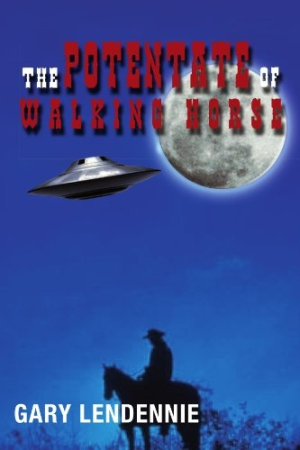The Potentate of Walking Horse
The first half of The Potentate of Walking Horse is a testament to Gary Lendennie’s skill at writing a Western that is both genuine and personal. Lendennie’s story of cowboy Rufus T. Breckenridge, his horse Ballbanger, and Rufus’ Indian companion, Two Dogs, is solid, beans-and-beef Western fare, complete with cattle rustlers, gamblers, gunslingers, marauding renegades, war parties, and the requisite cavalry charging to the rescue. That Lendennie switches genres mid-novel to enter the sci-fi realm is not so much unfortunate as it is disappointing.
Rufus is the narrator of the book, and he is relating the story to his great-great-grandson in August 1965. As the one-hundred-year-old cowboy tells it, “In those days, a variety of individuals and groups roamed the plains, and not all were upstanding citizens, and some was not citizens at all.” The flying saucer on the cover is a good hint that some of the latter came from another planet, but it is not until the halfway point of the novel that the spaceship and those it brought to the small Arkansas town of Walking Horse enter the plot.
It is not that the aliens-in-the-desert story is bad; it isn’t. It simply does not hold up against the Western that comprises the first half of the book. There are some interesting characters in the science fiction portion, but few as menacing as those who populate part one, where there are such colorful characters as Willie Snowshoe, who is “mean as a blind rattler and itching to prove it,” and John Pratt who has “murder in his heart, and also a chunk of lead.”
The author does deserve credit for not taking the easy alien-invasion route here. Lendennie’s otherworldly characters are not monsters sent to abduct or eat people, nor are they the scouts or vanguards of a conquering horde. They are explorers and observers, sent to study human behavior. Walking Horse is but the maze the scientists have created to test the lab rats. Some of the experiments the aliens poke and prod the inhabitants into participating in are comical, including an almost Vaudevillian seduction sparked by a mind-control device.
If the cowboy half of the novel is an adventure, the science fiction half is something of a light comedy. Rufus explains in his flashback that there was indeed “something awful strange” going on, but it was not something evil. As for the leader of the aliens, the Potentate of the title, he is a gentle and distant protagonist, something akin to the man beyond the curtain in Oz. “I was not intimidated by this space traveler who could control people’s minds and bring dead folks back to life,” says Rufus, of the powerful but rarely seen Potentate. Perhaps if Rufus had felt more threatened, the story would be more compelling.
Lendennie writes well and, for the most part, without noticeable errors. The science fiction story is a pleasant and interesting one, yet it lacks the energy, excitement, and tension of the Western that begins The Potentate of Walking Horse.
Reviewed by
Mark McLaughlin
Disclosure: This article is not an endorsement, but a review. The publisher of this book provided free copies of the book and paid a small fee to have their book reviewed by a professional reviewer. Foreword Reviews and Clarion Reviews make no guarantee that the publisher will receive a positive review. Foreword Magazine, Inc. is disclosing this in accordance with the Federal Trade Commission’s 16 CFR, Part 255.

